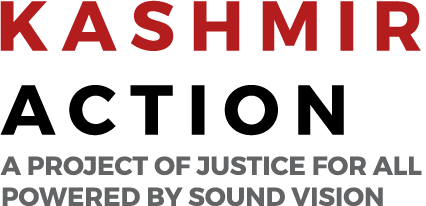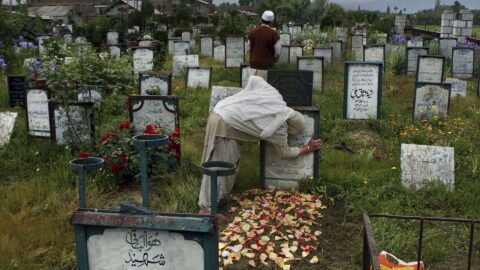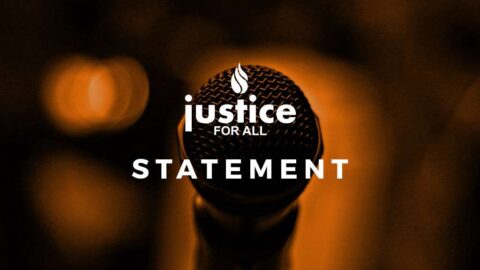Justice for All mourns the loss of life in the Pahalgam attack on April 22,…
Justice For All Statement on Collective Punishment Following Delhi Attack
November 13, 2025
Justice For All condemns the systematic campaign of collective punishment targeting Muslim communities across India following the November 10 bombing in Delhi. The detention of over 1,500 individuals across Jammu and Kashmir—most with no connection to the attack—represents a severe escalation of state repression that violates fundamental human rights and international legal norms.
Mass Detention as Collective Punishment
Within hours of the Delhi blast, Indian authorities launched coordinated operations targeting Muslims based solely on religious identity and geography. In Kashmir alone, police conducted over 400 cordon-and-search operations in Kulgam district within four days, raiding more than 200 locations and detaining approximately 1500 people under preventive laws that allow indefinite detention without charges or trial.
The crackdown extended far beyond any legitimate counterterrorism investigation. Authorities arrested family members of individuals suspected of militancy—including relatives of militants killed years earlier—based solely on kinship.
Nocturnal raids terrorized entire neighborhoods, with security forces breaking into homes at 2 a.m., assaulting detainees in front of their families, and seizing property without proper documentation.
Testimonies from affected families reveal a pattern of systematic abuse. Zainab Mir’s (name changed) husband was beaten and dragged from their home in Shopian; days later, she still doesn’t know his location. Rashid Ahmed’s (name changed) 67-year-old father with diabetes and heart problems was taken from Kulgam during a midnight raid—his only “crime” being related to a nephew killed in an encounter three years prior. Sameera Abdullah (name changed) watched twenty men from her Baramulla neighborhood disappear in a single night, none provided access to legal counsel or informed of charges against them.
This systematic targeting of entire communities based on collective guilt directly violates the Fourth Geneva Convention’s explicit prohibition on collective punishment, which forbids holding groups responsible for the actions of individuals. India’s use of preventive detention laws—particularly the Unlawful Activities Prevention Act (UAPA)—has created a parallel legal system where normal due process protections do not apply, enabling mass detention with minimal judicial oversight.
Media Complicity and Communal Incitement
Indian mainstream media has amplified rather than scrutinized these human rights violations. Major outlets repeated official narratives about “Islamic terror networks” without independent verification, while right-wing commentators explicitly called for revenge against Muslim communities. The BJP-linked social media account “Baba Banaras” claimed without evidence that the blast car belonged to a Kashmiri Muslim, demanding mass arrests in Kashmir. Commentator Abhijit Iyer-Mitra posted explicit calls for violence against Muslims.
This media environment has legitimized collective punishment by framing entire religious communities as security threats, creating political space for mass detention campaigns that would otherwise be recognized as systematic human rights violations.
Pattern of State Violence
The current crackdown follows a well-established pattern of collective punishment that has intensified since the abrogation of Article 370 in August 2019. Similar mass detention campaigns followed the Pahalgam attack in April 2025 and previous incidents, with hundreds arrested under vague accusations of being “overground workers” or “associates.”
This pattern mirrors the systematic torture and extrajudicial killings documented during in December 2023, when security forces tortured at least 25 civilians and killed three individuals in Rajouri and Poonch districts under the command of senior military officers.
Both campaigns reflect the Indian state’s reliance on collective punishment as a tool of social control, deliberately targeting entire populations to intimidate and suppress dissent.
Calls for Immediate Action
Justice For All urgently calls for:
- International Investigation: The United Nations must send an independent fact-finding mission to investigate mass detentions following the Delhi attack, document violations of international humanitarian law, and identify senior officials responsible for authorizing collective punishment operations.
- Targeted Sanctions: We urge the imposition of targeted sanctions under the UN’s sanction regime and the U.S. Global Magnitsky Human Rights Accountability Act against officials responsible for orchestrating mass detention campaigns and collective punishment operations.
- Immediate Release: All individuals detained without charges or evidence connecting them to the Delhi bombing must be immediately released. Those held under preventive detention laws must be granted access to legal counsel and judicial review.
- Legal Reform: The international community must pressure India to repeal or fundamentally reform the Unlawful Activities Prevention Act (UAPA) and the Armed Forces Special Powers Act (AFSPA), which create legal frameworks enabling mass detention and shielding perpetrators from accountability.
- Media Accountability: Global media outlets must provide independent coverage of human rights violations in Kashmir and challenge the Indian government’s censorship of local reporting. The systematic targeting of Muslim communities must be documented and exposed.
- Protection of Civil Liberties: The international community must demand that India restore due process protections, end nocturnal raids and custodial abuse, and ensure judicial oversight of detention operations.
Conclusion
The failure to respond to these systematic abuses risks entrenching a climate of impunity where entire communities can be punished for attacks they had no part in, where family ties become evidence of guilt, where midnight raids and indefinite detention become routine tools of governance. When 1,500 people can be detained in a week based on their religious identity rather than individual conduct, when 400 military-style operations can sweep through civilian areas in four days, when families are terrorized and denied all due process—the foundations of democratic governance and human rights have collapsed.
The international community must recognize collective punishment for what it is: a systematic violation of international humanitarian law that breeds the very radicalization and alienation it claims to prevent. Justice For All stands with the families torn apart by these operations and demands immediate accountability for those who weaponize counterterrorism to subjugate entire populations.
Justice For All is an international human rights organization dedicated to documenting and challenging systematic violations of civil liberties and advocating for accountability under international law.


